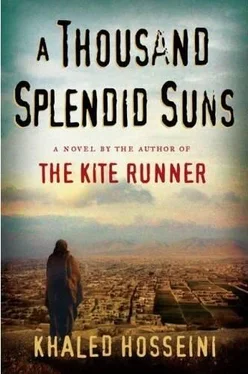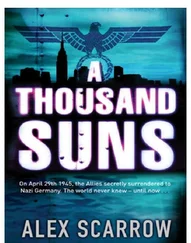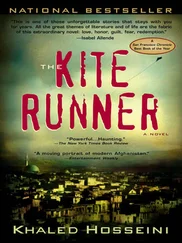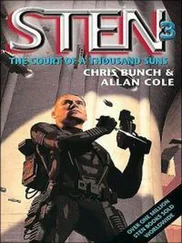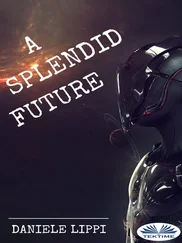When it was time for Jalil to leave, Mariam always stood in the doorway and watched him exit the clearing, deflated at the thought of the week that stood, like an immense, immovable object, between her and his next visit. Mariam always held her breath as she watched him go. She held her breath and, in her head, counted seconds. She pretended that for each second that she didn't breathe, God would grant her another day with Jalil.
At night, Mariam lay in her cot and wondered what his house in Herat was like. She wondered what it would be like to live with him, to see him every day. She pictured herself handing him a towel as he shaved, telling him when he nicked himself. She would brew tea for him. She would sew on his missing buttons. They would take walks in Herat together, in the vaulted bazaar where Jalil said you could find anything you wanted. They would ride in his car, and people would point and say, "There goes Jalil Khan with his daughter." He would show her the famed tree that had a poet buried beneath it.
One day soon, Mariam decided, she would tell Jalil these things. And when he heard, when he saw how much she missed him when he was gone, he would surely take her with him. He would bring her to Herat, to live in his house, just like his other children.
I know what I want," Mariam said to Jalil.
It was the spring of 1974, the year Mariam turned fifteen. The three of them were sitting outside the kolba, in a patch of shade thrown by the willows, on folding chairs arranged in a triangle.
"For my birthday… I know what I want."
"You do?" said Jalil, smiling encouragingly.
Two weeks before, at Mariam's prodding, Jalil had let on that an American film was playing at his cinema. It was a special kind of film, what he'd called a cartoon. The entire film was a series of drawings, he said, thousands of them, so that when they were made into a film and projected onto a screen you had the illusion that the drawings were moving. Jalil said the film told the story of an old, childless toymaker who is lonely and desperately wants a son. So he carves a puppet, a boy, who magically comes to life. Mariam had asked him to tell her more, and Jalil said that the old man and his puppet had all sorts of adventures, that there was a place called Pleasure Island, and bad boys who turned into donkeys. They even got swallowed by a whale at the end, the puppet and his father. Mariam had told Mullah Faizullah all about this film.
"I want you to take me to your cinema," Mariam said now. "I want to see the cartoon. I want to see the puppet boy."
With this, Mariam sensed a shift in the atmosphere. Her parents stirred in their seats. Mariam could feel them exchanging looks.
"That's not a good idea," said Nana. Her voice was calm, had the controlled, polite tone she used around Jalil, but Mariam could feel her hard, accusing glare.
Jalil shifted on his chair. He coughed, cleared his throat.
"You know," he said, "the picture quality isn't that good. Neither is the sound. And the projector's been malfunctioning recently. Maybe your mother is right. Maybe you can think of another present, Mariam jo."
"Aneh," Nana said. "You see? Your father agrees."
BUT LATER, at the stream, Mariam said, "Take me."
"I'll tell you what," Jalil said. "I'll send someone to pick you up and take you. I'll make sure they get you a good seat and all the candy you want."
"Nay. I want you to take me."
"Mariam jo-"
"And I want you to invite my brothers and sisters too. I want to meet them. I want us all to go, together. It's what I want."
Jalil sighed. He was looking away, toward the mountains.
Mariam remembered him telling her that on the screen a human face looked as big as a house, that when a car crashed up there you felt the metal twisting in your bones. She pictured herself sitting in the private balcony seats, lapping at ice cream, alongside her siblings and Jalil. "It's what I want," she said.
Jalil looked at her with a forlorn expression.
"Tomorrow. At noon. I'll meet you at this very spot. All right? Tomorrow?"
"Come here," he said. He hunkered down, pulled her to him, and held her for a long, long time.
* * *
AT FIRST, Nana paced around the kolba, clenching and unclenching her fists.
"Of all the daughters I could have had, why did God give me an ungrateful one like you? Everything I endured for you! How dare you! How dare you abandon me like this, you treacherous little harami!"
Then she mocked.
"What a stupid girl you are! You think you matter to him, that you're wanted in his house? You think you're a daughter to him? That he's going to take you in? Let me tell you something. A man's heart is a wretched, wretched thing, Mariam. It isn't like a mother's womb. It won't bleed, it won't stretch to make room for you. I'm the only one who loves you. I'm all you have in this world, Mariam, and when I'm gone you'll have nothing. You'll have nothing. You are nothing!"
Then she tried guilt.
"I'll die if you go. The jinn will come, and I'll have one of my fits. You'll see, I'll swallow my tongue and die. Don't leave me, Mariam jo. Please stay. I'll die if you go."
Mariam said nothing.
"You know I love you, Mariam jo."
Mariam said she was going for a walk.
She feared she might say hurtful things if she stayed: that she knew the jinn was a lie, that Jalil had told her that what Nana had was a disease with a name and that pills could make it better. She might have asked Nana why she refused to see Jalil's doctors, as he had insisted she do, why she wouldn't take the pills he'd bought for her. If she could articulate it, she might have said to Nana that she was tired of being an instrument, of being lied to, laid claim to, used. That she was sick of Nana twisting the truths of their life and making her, Mariam, another of her grievances against the world.
You're afraid, Nana, she might have said. You're afraid that I might find the happiness you never had. And you don't want me to be happy. You don't want a good life for me. you're the one with the wretched heart
THERE WAS A LOOKOUT, on the edge of the clearing, where Mariam liked to go. She sat there now, on dry, warm grass. Herat was visible from here, spread below her like a child's board game: the Women's Garden to the north of the city, Char-suq Bazaar and the ruins of Alexander the Great's old citadel to the south. She could make out the minarets in the distance, like the dusty fingers of giants, and the streets that she imagined were milling with people, carts, mules. She saw swallows swooping and circling overhead. She was envious of these birds. They had been to Herat. They had flown over its mosques, its bazaars. Maybe they had landed on the walls of Jalil's home, on the front steps of his cinema.
She picked up ten pebbles and arranged them vertically, in three columns. This was a game that she played privately from time to time when Nana wasn't looking. She put four pebbles in the first column, for Khadija's children, three for Afsoon's, and three in the third column for Nargis's children. Then she added a fourth column. A solitary, eleventh pebble.
THE NEXT MORNING, Mariam wore a cream-colored dress that fell to her knees, cotton trousers, and a green hijab over her hair. She agonized a bit over the hijab, its being green and not matching the dress, but it would have to do – moths had eaten holes into her white one.
She checked the clock. It was an old hand-wound clock with black numbers on a mint green face, a present from Mullah Faizullah. It was nine o'clock. She wondered where Nana was. She thought about going outside and looking for her, but she dreaded the confrontation, the aggrieved looks. Nana would accuse her of betrayal. She would mock her for her mistaken ambitions.
Читать дальше
